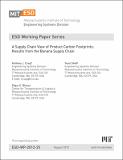| dc.contributor.author | Craig, Anthony J. | |
| dc.contributor.author | Blanco, Edgar E. | |
| dc.contributor.author | Sheffi, Yossi | |
| dc.date.accessioned | 2016-06-03T16:42:06Z | |
| dc.date.available | 2016-06-03T16:42:06Z | |
| dc.date.issued | 2012-08 | |
| dc.identifier.uri | http://hdl.handle.net/1721.1/102939 | |
| dc.description.abstract | Interest in the use of Life Cycle Assessment (LCA) to measure the carbon footprint of products has increased in recent years. While issues have been raised regarding the use of LCA to measure carbon footprints, the difficulties of doing so in the context of a modern supply chain have received less attention. In this paper we present a case study of the carbon footprint of bananas done in partnership with a leading importer of bananas and a U.S. retail grocery chain. Issues related to data quality and access represent a significant hurdle in measuring the carbon footprint across a supply chain, and we analyze our results in the context of ownership of the supply chain through the use of the GHG Protocol’s concept of emission scopes. Sharing information between supply chain partners has been promoted as one method of resolving data issues, but raises important issues related to supply chain variability. Through an analysis of the impact of transportation we show how the structure of a supply chain introduces significant variability in the carbon footprint required to serve different customers. | en_US |
| dc.language.iso | en_US | en_US |
| dc.publisher | Massachusetts Institute of Technology. Engineering Systems Division | en_US |
| dc.relation.ispartofseries | ESD Working Papers;ESD-WP-2012-25 | |
| dc.title | A Supply Chain View of Product Carbon Footprints: Results from the Banana Supply Chain | en_US |
| dc.type | Working Paper | en_US |
